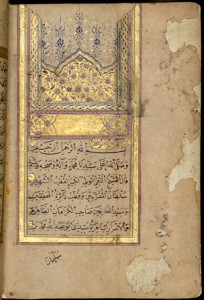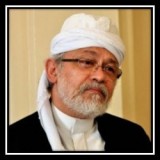 Celebrating the Quran and Celebrating Taqwa
Celebrating the Quran and Celebrating Taqwa
Azzawia Mosque
20 November 1998
“The month of Ramadaan is the month in which the Quran was revealed as a guidance for humanity, as a clear proof of that guidance, and as a criterion for distinguishing between right and wrong” (2 : 185).
In as much as celebrating the Prophet’s birthday (the Milad un-Nabi) can be read as a celebration of the greatness of the Prophet (SAW) in his aspect of the perfect man (Insan ul-Kamil); and in as much as Yaum Ashura can be read as a celebration of the saving of Nabi Musa (AS) from the tyrannical pharaonic oppressors; similarly Ramadaan can be read as a celebration of the revelation of the Quran during this month. It is a celebration of the Quran as both a living guidance and a living proof to humanity. It stands as a living proof of the divinity of Allahu Ta’aala, as a living proof of the authenticity of the prophethood of Muhammad (SAW), and of the supremacy of revelation over all else.
But the Quran is also a Huda (a guidance). And as Huda – as true guidance – it teaches us how to live our lives as complete human beings. It teaches us how to live our lives with respect, dignity, honor, and love. It further teaches us that Allahu Ta’aala is a divinity that embraces the concerns of all humanity.
It is also important to remember that the guidance and concerns of Allahu Ta’aala are not limited to mere theoretical or idealistic utterances. The guidance of Allahu Ta’aala plunges us into the mainstream of our earthly existence. One of the ways in which Allahu Ta’aala has done this is by making the fast obligatory upon all of us.
Not only are we required to sympathize with the poor and the hungry, but we are thrown into the very experience of hunger.
Not only are we required to reflect upon our condition in a society with its mores, customs, habits, rules, and general routine – which looms far greater than the sum of its individuals, but it forces us to reflect upon the very nature of that society. It is so easy to become a cog in the political, economic, social, and industrial machine. In short to become a spiritually forgetful being in the material and mechanical processes of ordinary life.
Fasting forces us to break this forgetfulness, and forces us to anchor the consciousness of truth and spirituality in every domain of our existence i.e. to act upon the truth of Islam and to live by its spirituality.
Fasting, by depriving us of the daily luxuries and niceties of our mundane existence asserts the supremacy of our essential condition as beings endowed with a soul (ruh) over our condition as material and temporal beings. Fasting, therefore, at once draws us into the bosom of Allahu Ta’aala and allows us to reflect upon the high moral, social, and spiritual values which Islam sets for us. In other words fasting focuses our attention on the broader meaning of Taqwa as expressed in the following verse:
“O you who believe, fasting has been prescribed upon you as it has been prescribed upon those before you so that you may learn Taqwa” (2 : 183).
The Arabic of the phrase in the above verse “so that you may learn Taqwa” reads as “l’allakum tattaqun”. The term “taqwa” – in its narrower meaning – has been variously translated as fear, piety, self-restraint, and guarding against evil. However, to do justice to its meaning, and to better understand the link between the Quran as Huda (true guidance) and Taqwa as one of the most desired virtues in man, a more comprehensive understanding of the term is required. That understanding is dependent on our understanding of the nature of man and woman.
The Islamic perspective is that we, as people, are composed of both body and soul or matter and spirit. We are also considered to be both the viceregent of Allah on earth (khalifatullah) and his servants (‘ibaadullah). As viceregents we are ordered to perfect our earthly existence whether it be in our private, domestic, social, economic or political lives. As servants of Allah we are ordered to perfect our spiritual existence. Taqwa circumscribes both these conditions. In other words, and as alluded to earlier, it means to observe our duty towards Allahu Ta’aala in all our social and communal relations (towards Muslims and non-Muslims alike); and in our spiritual relations towards Allahu Ta’aala Himself. This is a difficult task and one of the means that Allah has given us to attain this level is the fast. But, and typical of Quranic “pragmatism”, there are no false promises. In the Arabic the emphasis is quite clearly on the phrase “l’allakum” (“so that you may” or “perhaps”). The means to Taqwa, through the great institution of fasting, have been placed at our disposal. It is up to us to use, misuse, or even ignore the means. This condition is encapsulated in the following Prophetic saying : “For those who do not refrain from lying or acting on such lies, Allah has no need of their abandoning their food and drink” (Bukhari).
Taqwa can further be realized through three opportunities provided for us by the fast:
- The disciplining of the will (tarbiyat ul-Iradah)
- The purification of the self (tazkiyat un-Nafs)
- The purification of the soul (tasfiyat ur-Ruh)
Allah says at the conclusion of the verse initially quoted:
” That He wants you to complete the prescribed period (of fasting) so that you are able to magnify the greatness of Allah for His having guided you, and so that – perchance – you may be thankful” (2 : 185).
The greatness of Ramadan therefore lies in the opportunity it offers for the development of Taqwa – a virtue that allows us to truly participate in that great cosmic celebration in honor of the revelation of the Quran as a Huda to all people, which is, as mentioned earlier, Ramadan itself. It is a virtue furthermore, that allows us to magnify Allah Ta`ala as He ought to be magnified, namely, with complete awareness of our earthly duties and spiritual vocation; and, therefore, to be of those who are truly thankful to Allah. It is a virtue too, which is ultimately celebrated in the Quran itself, for Allah says: ” The best of you are those who have learnt Taqwa” (49 : 13).



